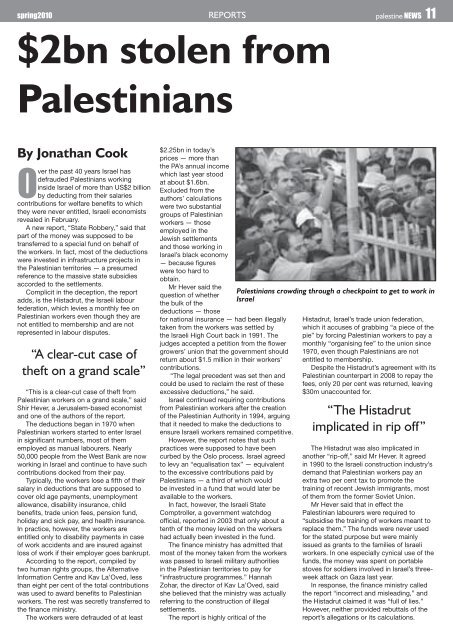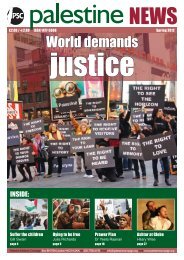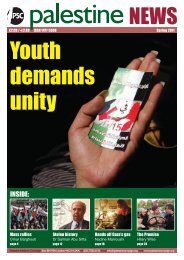INSIDE: - Palestine Solidarity Campaign
INSIDE: - Palestine Solidarity Campaign
INSIDE: - Palestine Solidarity Campaign
You also want an ePaper? Increase the reach of your titles
YUMPU automatically turns print PDFs into web optimized ePapers that Google loves.
spring2010 REPORTS<br />
palestine NEWS 11<br />
$2bn stolen from<br />
Palestinians<br />
By Jonathan Cook<br />
Over the past 40 years Israel has<br />
defrauded Palestinians working<br />
inside Israel of more than US$2 billion<br />
by deducting from their salaries<br />
contributions for welfare benefits to which<br />
they were never entitled, Israeli economists<br />
revealed in February.<br />
A new report, “State Robbery,” said that<br />
part of the money was supposed to be<br />
transferred to a special fund on behalf of<br />
the workers. In fact, most of the deductions<br />
were invested in infrastructure projects in<br />
the Palestinian territories — a presumed<br />
reference to the massive state subsidies<br />
accorded to the settlements.<br />
Complicit in the deception, the report<br />
adds, is the Histadrut, the Israeli labour<br />
federation, which levies a monthly fee on<br />
Palestinian workers even though they are<br />
not entitled to membership and are not<br />
represented in labour disputes.<br />
“A clear-cut case of<br />
theft on a grand scale”<br />
“This is a clear-cut case of theft from<br />
Palestinian workers on a grand scale,” said<br />
Shir Hever, a Jerusalem-based economist<br />
and one of the authors of the report.<br />
The deductions began in 1970 when<br />
Palestinian workers started to enter Israel<br />
in significant numbers, most of them<br />
employed as manual labourers. Nearly<br />
50,000 people from the West Bank are now<br />
working in Israel and continue to have such<br />
contributions docked from their pay.<br />
Typically, the workers lose a fifth of their<br />
salary in deductions that are supposed to<br />
cover old age payments, unemployment<br />
allowance, disability insurance, child<br />
benefits, trade union fees, pension fund,<br />
holiday and sick pay, and health insurance.<br />
In practice, however, the workers are<br />
entitled only to disability payments in case<br />
of work accidents and are insured against<br />
loss of work if their employer goes bankrupt.<br />
According to the report, compiled by<br />
two human rights groups, the Alternative<br />
Information Centre and Kav La’Oved, less<br />
than eight per cent of the total contributions<br />
was used to award benefits to Palestinian<br />
workers. The rest was secretly transferred to<br />
the finance ministry.<br />
The workers were defrauded of at least<br />
$2.25bn in today’s<br />
prices — more than<br />
the PA’s annual income<br />
which last year stood<br />
at about $1.6bn.<br />
Excluded from the<br />
authors’ calculations<br />
were two substantial<br />
groups of Palestinian<br />
workers — those<br />
employed in the<br />
Jewish settlements<br />
and those working in<br />
Israel’s black economy<br />
— because figures<br />
were too hard to<br />
obtain.<br />
Mr Hever said the<br />
question of whether<br />
the bulk of the<br />
deductions — those<br />
for national insurance — had been illegally<br />
taken from the workers was settled by<br />
the Israeli High Court back in 1991. The<br />
judges accepted a petition from the flower<br />
growers’ union that the government should<br />
return about $1.5 million in their workers’<br />
contributions.<br />
“The legal precedent was set then and<br />
could be used to reclaim the rest of these<br />
excessive deductions,” he said.<br />
Israel continued requiring contributions<br />
from Palestinian workers after the creation<br />
of the Palestinian Authority in 1994, arguing<br />
that it needed to make the deductions to<br />
ensure Israeli workers remained competitive.<br />
However, the report notes that such<br />
practices were supposed to have been<br />
curbed by the Oslo process. Israel agreed<br />
to levy an “equalisation tax” — equivalent<br />
to the excessive contributions paid by<br />
Palestinians — a third of which would<br />
be invested in a fund that would later be<br />
available to the workers.<br />
In fact, however, the Israeli State<br />
Comptroller, a government watchdog<br />
official, reported in 2003 that only about a<br />
tenth of the money levied on the workers<br />
had actually been invested in the fund.<br />
The finance ministry has admitted that<br />
most of the money taken from the workers<br />
was passed to Israeli military authorities<br />
in the Palestinian territories to pay for<br />
“infrastructure programmes.” Hannah<br />
Zohar, the director of Kav La’Oved, said<br />
she believed that the ministry was actually<br />
referring to the construction of illegal<br />
settlements.<br />
The report is highly critical of the<br />
Palestinians crowding through a checkpoint to get to work in<br />
Israel<br />
Histadrut, Israel’s trade union federation,<br />
which it accuses of grabbing “a piece of the<br />
pie” by forcing Palestinian workers to pay a<br />
monthly “organising fee” to the union since<br />
1970, even though Palestinians are not<br />
entitled to membership.<br />
Despite the Histadrut’s agreement with its<br />
Palestinian counterpart in 2008 to repay the<br />
fees, only 20 per cent was returned, leaving<br />
$30m unaccounted for.<br />
“The Histadrut<br />
implicated in rip off”<br />
The Histadrut was also implicated in<br />
another “rip-off,” said Mr Hever. It agreed<br />
in 1990 to the Israeli construction industry’s<br />
demand that Palestinian workers pay an<br />
extra two per cent tax to promote the<br />
training of recent Jewish immigrants, most<br />
of them from the former Soviet Union.<br />
Mr Hever said that in effect the<br />
Palestinian labourers were required to<br />
“subsidise the training of workers meant to<br />
replace them.” The funds were never used<br />
for the stated purpose but were mainly<br />
issued as grants to the families of Israeli<br />
workers. In one especially cynical use of the<br />
funds, the money was spent on portable<br />
stoves for soldiers involved in Israel’s threeweek<br />
attack on Gaza last year.<br />
In response, the finance ministry called<br />
the report “incorrect and misleading,” and<br />
the Histadrut claimed it was “full of lies.”<br />
However, neither provided rebuttals of the<br />
report’s allegations or its calculations.







